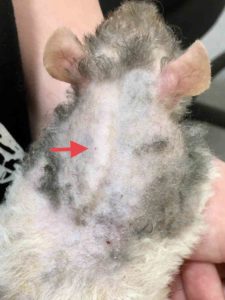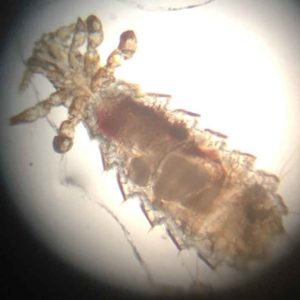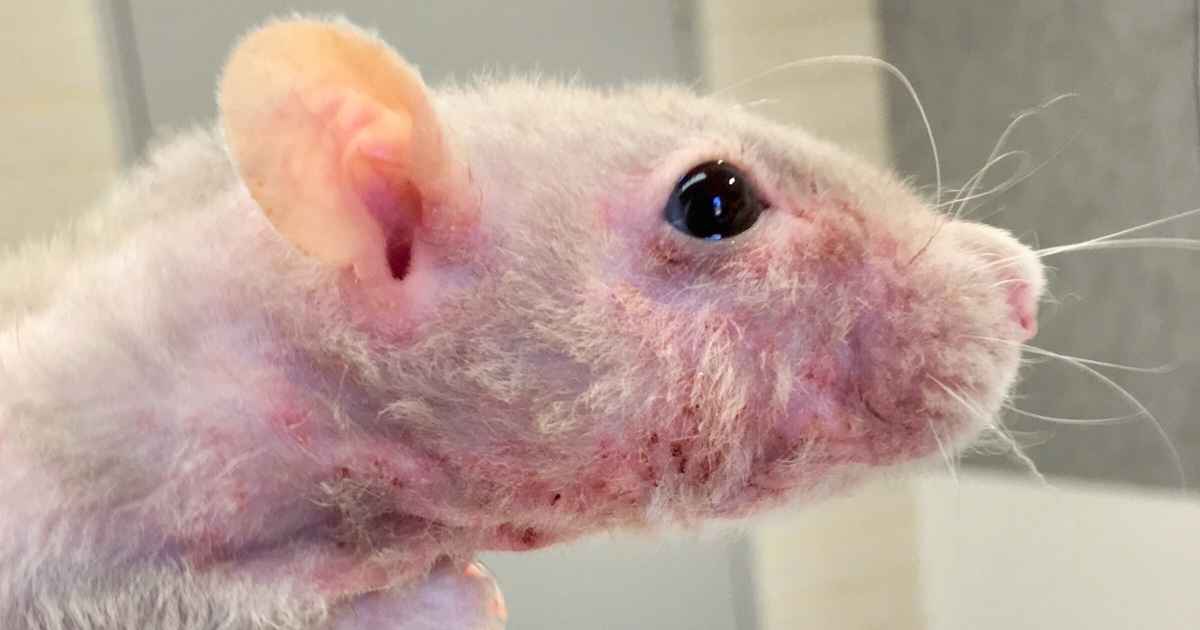Updated July 3, 2023
Hair loss, itching and skin wounds are one of the most common and frustrating skin conditions of rats.
Signs include:
- Itching and scratching
- Biting at the fur
- Hair loss and alopecia
- Crusts and scabs
- Bleeding sores
Most skin conditions of rats look the same. Therefore, the best thing to do is rule out the common causes as best you can. Unfortunately, there will be some rats that fail to respond to any treatments.
Barbering
Barbering is where one rat excessively grooms either themself or others. Causes include stress, overcrowding or incompatible social groups.
Clues to barbering are the general absence of skin lesions such as scabs and sores. The hair may be cropped short in just one area or over the whole body, but the skin should be intact underneath.
Treatment may involve trial separation via a mesh divider or reducing overcrowding. If that is not possible, try increasing the available space via extra suspended beds or tunnels.
Mites & Lice

Parasites are extremely common in groups of rats and quite easy to eliminate. Ask your vet to give three injections of ivermectin 14 days apart to all the rats, not just those with symptoms.
Lice in particular are large enough to be seen as mobile dark brown spots in the coat. I’ve arrowed one in the picture of a rat with lice. Below is the culprit: Polyplax serrata, known (no joke) as the house mouse louse!

Most will charge just one visit fee for all the rats. It’s a good idea to clean all the cage furniture and bedding during the treatment but it’s probably not essential. Then you wait and see if the treatment works.
Additionally, it has been reported that a single drop from Revolution® Puppy & Kitten every 14 days can be effective. However, this is off-label and must be cleared by your vet. Sprays and powders are not recommended.
Allergy
All vets who work with rats suspect that allergy is quite common. Culprits may include certain litter types, disinfectants and cleaners, or foods.
You can read here about the principles behind an elimination diet, but in rats we usually just use brown rice. Although this isn’t balanced for the long term, it will be OK for the 8 week trial period. Other allergens can also only be identified by a process of elimination.
Treatments that may help an allergic rat will include:
- Skin-friendly shampoo and conditioner (I use Dermcare Aloveen)
- Fish oil in the diet (3g/kg/day has been shown to be effective- that equates to almost a whole 1g capsule for a large rat so it’s best to start with a lower dose)
- Prednisolone drops from your vet (this is a little risky so it’s a last resort)
Ringworm
Ringworm is a fungal infection of the skin. It’s theoretically as likely in a rat as a cat or dog, but in practice seems rare. A clue will be skin lesions appearing on an in-contact human member of the household.
Your vet can suggest skin rinses or creams if ringworm is suspected. Be careful using anything medicinal on the surface of rat to avoid excessive and toxic doses either being absorbed or ingested.
Nutrition
Poor nutrition is known to cause skin problems in other species and is often suspected in rats. If this concerns you, call your rat vet or knowledgeable pet store for good diet advice.
Genetics
Have something to add? Comments (if open) will appear within 24 hours.
By Andrew Spanner BVSc(Hons) MVetStud, a vet in Adelaide, Australia. Meet his team here. The information provided here is not intended to be used as a substitute for going to the vet. If your pet is unwell, please seek veterinary attention.


I took my rats to the vet and after many expensive tests they had determined mites though none were found during the tests. I ordered $100 worth of Revolution and used it per vet’s orders making sure it had contact with skin…still no better. Their diet was Oxbow and recently slowly transitioned to Science Selective to see if that may help but still nothing. They are three brothers that get along and have a double critter nation but spend majority of their time getting to free roam the room with me when they want. The woman I got them from said one of the parents was part bald rat and that’s why their hair is falling out but doesn’t explain them reacting oddly to touch as if it bothers them in certain areas and no reason to have a constant sore that bleeds. Feel horrible for my three boys and feel guilty that I can’t help them. Any other suggestions? I’ve attempted bathing but they aren’t fans of water.
Hi NK. I’m sorry, these are very tricky cases when the simple things have been tried. You are not alone and there don’t appear to be easy answers. Your best bet is to find a vet with extensive experience in rodents as there’s still things that can be tried.
My female rat sapphire has multiple scabs on her and won’t stop picking at them only on her back tho. She hasn’t lost energy and eats and drinks fine! Purely just seemed itchy . No mites or lice .
Hi Theo. If she’s picking at them then she certainly is itchy and I recommend a check up.
My rat has an extremely bad scab on her back and it seems to be affecting her lots, we don’t know what to do and she just keeps itching is so it won’t get better does anybody have any solutions please it would really be appreciated x
I’m having the same problems with my rat. Did you manage to find a solution? Thank you! x
My rat had a scab on his cheek. I would apply a fairly good-sized dollop of neosporen on it as protection. It healed pretty quick after that
Hi Jen. That’s great to hear – my only comment is to be careful about the quantity, as rats will lick it off and ingest it – I would use just a smear, not a dollop.